Fleurs du Mal Magazine


Or see the index

Music on Christmas Morning
‘Music I love – but never strain
Could kindle raptures so divine,
So grief assuage, so conquer pain,
And rouse this pensive heart of mine –
As that we hear on Christmas morn,
Upon the wintry breezes born.
Though Darkness still her empire keep,
And hours must pass, ere morning break;
From troubled dreams, or slumbers deep,
That music kindly bids us wake:
It calls us, with an angel’s voice,
To wake, and worship, and rejoice;
To greet with joy the glorious morn,
Which angels welcomed long ago,
When our redeeming Lord was born,
To bring the light of Heaven below;
The Powers of Darkness to dispel,
And rescue Earth from Death and Hell.
While listening to that sacred strain,
My raptured spirit soars on high;
I seem to hear those songs again
Resounding through the open sky,
That kindled such divine delight,
In those who watched their flocks by night.
With them – I celebrate His birth –
Glory to God, in highest Heaven,
Good will to men, and peace on Earth,
To us a saviour-king is given;
Our God is come to claim His own,
And Satan’s power is overthrown!
A sinless God, for sinful men,
Descends to suffer and to bleed;
Hell must renounce its empire then;
The price is paid, the world is freed.
And Satan’s self must now confess,
That Christ has earned a Right to bless:
Now holy Peace may smile from heaven,
And heavenly Truth from earth shall spring:
The captive’s galling bonds are riven,
For our Redeemer is our king;
And He that gave his blood for men
Will lead us home to God again.’
Anne Brontë
(1820 – 1849)
Music on Christmas Morning (1843)
Anne Brontë (1820 – 1849) was an English novelist and poet, the youngest member of the Brontë literary family. Charlotte (1816–1855) and Emily Brontë (1818–1848) were her sisters.
• fleursdumal.nl magazine
More in: Anne, Emily & Charlotte Brontë, Archive A-B, Archive A-B, Brontë, Anne, Emily & Charlotte
Op 19 december 2019 is – na een zeer kort ziekbed – overleden dichter J.A. (Jules) Deelder. De dichter werd volgens zijn familie “tot zijn eigen verbazing” 75 jaar oud.
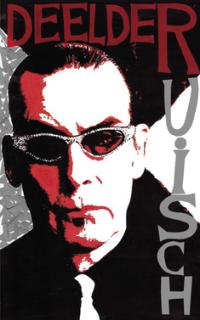 Jules Deelder (Rotterdam, 1944 – 2019) was een opvallende verschijning en erg geliefd als schrijver, dichter, muzikant en performer. Hij was zijn leven lang een groot liefhebber van Jazz en fan van de Rotterdamse voetbalclub Sparta. De club riep hem, kort voor zijn dood, nog uit tot lid van verdienste. Verder stond Deelder bekend als ‘De nachtburgemeester van Rotterdam’.
Jules Deelder (Rotterdam, 1944 – 2019) was een opvallende verschijning en erg geliefd als schrijver, dichter, muzikant en performer. Hij was zijn leven lang een groot liefhebber van Jazz en fan van de Rotterdamse voetbalclub Sparta. De club riep hem, kort voor zijn dood, nog uit tot lid van verdienste. Verder stond Deelder bekend als ‘De nachtburgemeester van Rotterdam’.
Jules Deelder werd gerekend tot de ‘performance poets’ ( of ‘popdichters’) een beweging die aansloot bij de ‘Beat Generation’ van Amerikaanse dichters als Allen Ginsberg en Jack Kerouac.
De familie van Deelder en uitgeverij De Bezige Bij, staan met dit gedicht stil bij zijn overlijden:
Zijn gaan is
een komen
Zijn komen
een gaan
Hij houdt niet
van zitten
Hij blijft
liever staan
Zichzelf
en de wereld
een raadsel
(Uit: De Zwarte Jager – J.A. Deelder, 1973)
I.M.
Jules Deelder
(1944 – 2019)
• fleursdumal.nl magazine
More in: # Music Archive, #Archive A-Z Sound Poetry, #Beat Generation Archives, #Editors Choice Archiv, Archive C-D, Archive C-D, In Memoriam, Jules Deelder
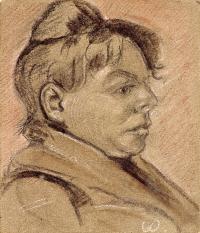
De verminkte.
De borst
verscheurd.
Het been
in gruis.
Hoera!
Lang leev’
het krijgs-
gedruisch!
Dat hinkt.
Dat kermt.
Dat stuipt.
Dat bloedt.
Hoera!
Hoera!
Die moord
is goed!
Agnita Feis
(1881 – 1944)
Uit: Oorlog. Verzen in Staccato (1916).
De verminkte
• fleursdumal.nl magazine
More in: *War Poetry Archive, Agnita Feis, Antony Kok, Archive E-F, De Stijl, Feis, Agnita, Theo van Doesburg, WAR & PEACE

Vigil strange I kept on the field one night
Vigil strange I kept on the field one night;
When you my son and my comrade dropt at my side that day,
One look I but gave which your dear eyes return’d with a look I shall never forget,
One touch of your hand to mine O boy, reach’d up as you lay on the ground,
Then onward I sped in the battle, the even-contested battle,
Till late in the night reliev’d to the place at last again I made my way,
Found you in death so cold dear comrade, found your body son of responding kisses, (never again on earth responding,)
Bared your face in the starlight, curious the scene, cool blew the moderate night-wind,
Long there and then in vigil I stood, dimly around me the battle-field spreading,
Vigil wondrous and vigil sweet there in the fragrant silent night,
But not a tear fell, not even a long-drawn sigh, long, long I gazed,
Then on the earth partially reclining sat by your side leaning my chin in my hands,
Passing sweet hours, immortal and mystic hours with you dearest comrade–not a tear, not a word,
Vigil of silence, love and death, vigil for you my son and my soldier,
As onward silently stars aloft, eastward new ones upward stole,
Vigil final for you brave boy, (I could not save you, swift was your death,
I faithfully loved you and cared for you living, I think we shall surely meet again,)
Till at latest lingering of the night, indeed just as the dawn appear’d,
My comrade I wrapt in his blanket, envelop’d well his form,
Folded the blanket well, tucking it carefully over head and carefully under feet,
And there and then and bathed by the rising sun, my son in his grave, in his rude-dug grave I deposited,
Ending my vigil strange with that, vigil of night and battle-field dim,
Vigil for boy of responding kisses, (never again on earth responding,)
Vigil for comrade swiftly slain, vigil I never forget, how as day brighten’d,
I rose from the chill ground and folded my soldier well in his blanket,
And buried him where he fell.
Walt Whitman
(1819 – 1892)
Vigil strange I kept on the field one night
From: Leaves of grass
• fleursdumal.nl magazine
More in: Archive W-X, Archive W-X, Whitman, Walt
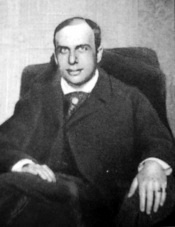
L’ombre visqueuse emplit…
L’ombre visqueuse emplit jusqu’au fond la chambrée,
Des moucherons gluants couvrent la planche à pain.
Deux soldats ronflent sous leur couverte cabrée:
C’est un bleu de tringlot avec son vieux copain.
Le long de la muraille écailleuse et sabrée
Par de grands crachats noirs, tourbillonne un lopin
De mouchoir instructif, à la teinte marbrée,
Coiffant le shako neuf d’oreilles de lapin.
Le brigadier, entrant, heurte, sous ses semelles,
La carcasse sonore et vide des gamelles:
Les hommes réveillés murmurent dans leur lit.
Il tâte de ses mains le bât-flanc et se couche
Puis dort, de-ci de-là, comme une souche,
Et sous son corps pesant fait craquer le châlit.
Marcel Schwob
(1867-1905)
L’ombre visqueuse emplit…
• fleursdumal.nl magazine
More in: Archive S-T, Archive S-T, Marcel Schwob
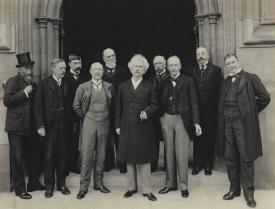
A Lament
They beat me black; they beat me blue,
Until my rue-
-ful visage would not bear inspection;
They broke me, too,
Though ’twas I who
Was once considered quite perfection.
How things are changed ! I once was great,
But yet of late
IVe fallen from my proud position ;
Hard is my fate,
I’m out of date ;
How altered now is my condition !
How will it end? What’s Fate’s decree?
Perchance Til be
Hung high as Haman by a neck-cord ;
Oh ! pity me,
For here you see
A broken, battered, shattered record.
Montague Horatio Mostyn Turtle Pigott
(1865–1927)
A Lament (Poem)
•fleursdumal.nl magazine
More in: Archive O-P, Archive O-P, Mostyn Turtle Pigott
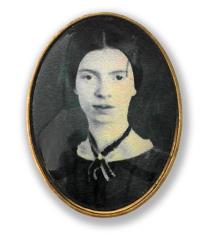
Drowning is not so pitiful
Drowning is not so pitiful
As the attempt to rise.
Three times, ’t is said, a sinking man
Comes up to face the skies,
And then declines forever
To that abhorred abode
Where hope and he part company, —
For he is grasped of God.
The Maker’s cordial visage,
However good to see,
Is shunned, we must admit it,
Like an adversity.
Emily Dickinson
(1830-1886)
Drowning is not so pitiful
• fleursdumal.nl magazine
More in: Archive C-D, Archive C-D, Dickinson, Emily
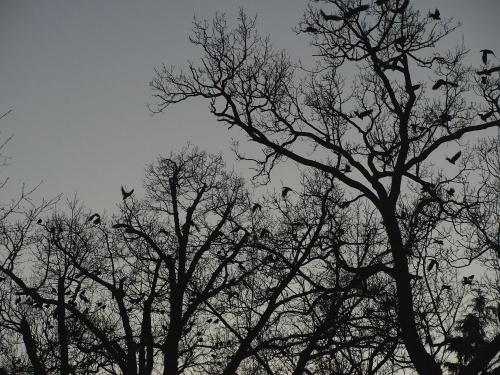
Kolonie
Kauwval in de avond: vrije val naar nesten. Ontrouw
wordt hier niet gedoogd. Ze schijnen op de plattegrond
van het slapen te dolen maar weten feilloos hun weg
boven die dubbele bodems van diepte. Craquelures
in de lucht lijken takken. Nacht weet zich een grens.
© gedicht Bert Bevers 2019
© foto Joep Eijkens 2019
• fleursdumal.nl magazine
More in: Archive A-B, Archive E-F, Bevers & Eijkens, Bevers, Bert, Joep Eijkens Photos
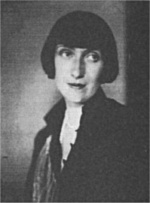
Angst
O wie ist diese Nacht so schwer,
Und wie hangen die Wolken so tief.
Warum stöhnen die sanften Tiere,
Bluten laubdunkle Bäume,
Seufzt in jedem Winkel der Tod?
Wo sind die blassen Engel geblieben
Und die zittergoldenen Sterne?
Ist Gott gestorben?
O, diese Nacht ist tausend Jahre schwer.
Auf der Brücke geht noch mit hastigen Schritten ein Mann.
Er wird zu spät kommen –
In der Mansarde salbt der junge Priester
Den Mund der Sterbenden.
Eine schwarze Blume wächst furchtbar in ihre Fieber,
Aber selig umglänzt der Mond ihre Wangen.
In meinem Zimmer knistert die Kerze.
Schmächtige Schatten steigen aus den Wänden:
Leben, die ich gelebt habe und vergaß.
Ein Gesicht weint lange in meinen Händen.
Francisca Stoecklin
(1894-1931)
Angst
• fleursdumal.nl magazine
More in: Archive S-T, Archive S-T, Stoecklin, Francisca
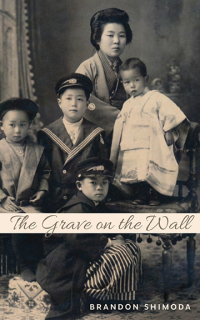 The Grave on the Wall is a memoir and a book of mourning, a grandson’s attempt to reconcile his own uncontested citizenship with his grandfather’s lifelong struggle.
The Grave on the Wall is a memoir and a book of mourning, a grandson’s attempt to reconcile his own uncontested citizenship with his grandfather’s lifelong struggle.
Award-winning poet Brandon Shimoda has crafted a lyrical portrait of his paternal grandfather, Midori Shimoda, whose life—child migrant, talented photographer, suspected enemy alien and spy, desert wanderer, American citizen—mirrors the arc of Japanese America in the twentieth century.
In a series of pilgrimages, Shimoda records the search to find his grandfather, and unfolds, in the process, a moving elegy on memory and forgetting.
“Shimoda brings his poetic lyricism to this moving and elegant memoir, the structure of which reflects the fragmentation of memories. . . . It is at once wistful and devastating to see Midori’s life come full circle . . . In between is a life with tragedy, love, and the horrors unleashed by the atomic bomb.”––Booklist
Title: The Grave on the Wall
Author: Brandon Shimoda
Publisher: City Lights Publishers
Format: Paperback
ISBN-10 0872867900
ISBN-13 9780872867901
Publication Date: 06 August 2019
222 pages
List Price $16.95
# New books
Brandon Shimoda
The Grave on the Wall
• fleursdumal.nl magazine
More in: - Book News, - Bookstores, Archive S-T, Archive S-T, Art & Literature News
Paper Aeroplane: Selected Poems 1989-2014 by Simon Armitage is the essential selection of poems from one of Britain’s foremost contemporary poets.
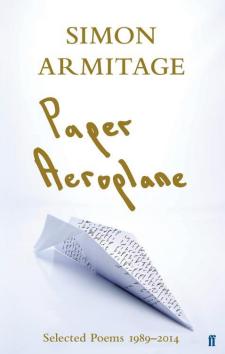 When Simon Armitage burst on to the poetry scene in 1989 with his spectacular debut Zoom!, readers were introduced to an exceptional new talent who would reshape the landscape of contemporary poetry in the years to come.
When Simon Armitage burst on to the poetry scene in 1989 with his spectacular debut Zoom!, readers were introduced to an exceptional new talent who would reshape the landscape of contemporary poetry in the years to come.
Twenty-five years on, Simon Armitage’s reputation as one of the nation’s most original, most respected and best-loved poets seems secure. Paper Aeroplane: Poems 1989-2014 is the author’s own selection from across a quarter-century of work, from his debut to the latest, uncollected work. Drawing upon all of his award-winning poetry collections, including Kid, Book of Matches, The Universal Home Doctor and Seeing Stars, this generous selection provides an essential gathering of this most thrilling of poets, and is key reading for students and general readers alike.
Simon Armitage was born in West Yorkshire and is Professor of Poetry at the University of Leeds. A recipient of numerous prizes and awards, he has published twelve collections of poetry, including Seeing Stars (2010), The Unaccompanied (2017), Sandettie Light Vessel Automatic (2019) and his acclaimed translation of Sir Gawain and the Green Knight (2007). He writes extensively for television and radio, and is the author of two novels and the non-fiction bestsellers All Points North (1998), Walking Home (2012) and Walking Away (2015). His theatre works include The Last Days of Troy, performed at Shakespeare’s Globe in 2014. In 2015 he was appointed Professor of Poetry at Oxford University and in 2018 he was awarded the Queen’s Gold Medal for Poetry. Simon Armitage is Poet Laureate of the UK.
Paper Aeroplane: Selected Poems 1989-2014
by Simon Armitage (Author), Sue Roberts (Author)
2014/2015
Hardback Price £14.99
Paperback Price £10.99
Pages: 248pp
Publisher: Faber and Faber Poetry
Language: English
ISBN-10: 0571310699
ISBN-13: 978-0571310692
# new books
Paper Aeroplane:
Selected Poems 1989-2014
by Simon Armitage (Author)
• fleursdumal.nl magazine
More in: - Book Lovers, - Book News, Archive A-B, Archive A-B, Armitage, Simon
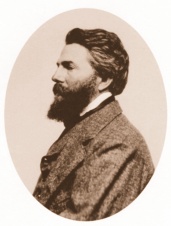
The Maldive Shark
About the Shark, phlegmatical one,
Pale sot of the Maldive sea,
The sleek little pilot-fish, azure and slim,
How alert in attendance be.
From his saw-pit of mouth, from his charnel of maw,
They have nothing of harm to dread,
But liquidly glide on his ghastly flank
Or before his Gorgonian head;
Or lurk in the port of serrated teeth
In white triple tiers of glittering gates,
And there find a haven when peril’s abroad,
An asylum in jaws of the Fates!
They are friends; and friendly they guide him to prey,
Yet never partake of the treat —
Eyes and brains to the dotard lethargic and dull,
Pale ravener of horrible meat.
Herman Melville
(1819 – 1891)
The Maldive Shark
• fleursdumal.nl magazine
More in: Archive M-N, Archive M-N, Herman Melville, Natural history
Thank you for reading Fleurs du Mal - magazine for art & literature